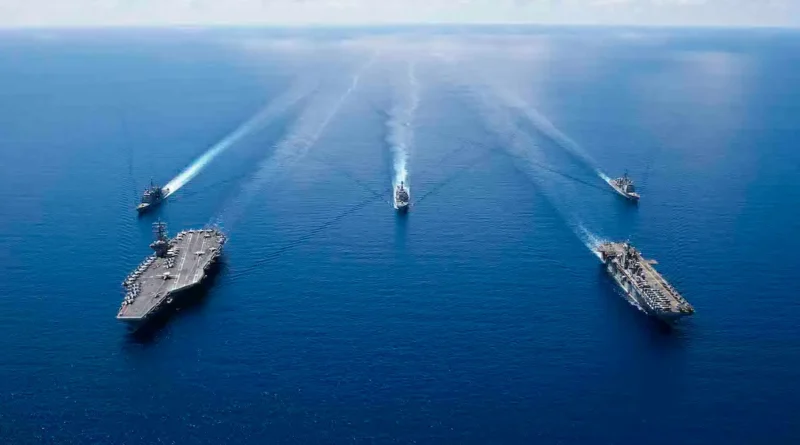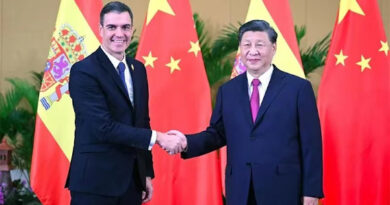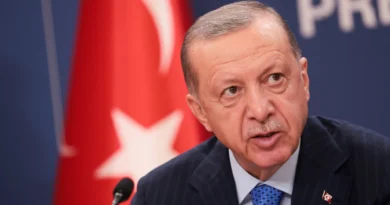The enemy within
The war industry, a state within a state, eviscerates the nation, lurches from one military fiasco to another, strips us of civil liberties, and pushes us into suicidal wars with Russia and China.
CHRIS HEDGES
The United States is a stratocracy, a form of government dominated by the military. It is axiomatic between the two ruling parties that there must be constant preparation for war.
The huge budgets of the war machine are sacrosanct. Their billions of dollars in waste and fraud are ignored. His military fiascos in Southeast Asia, Central Asia and the Middle East have disappeared into the vast cavern of historical amnesia.
This amnesia, which means there is never any accountability, empowers the war machine to gut the country economically and drive the Empire into one self-destructive conflict after another. The militarists win every election. They can't lose. It is impossible to vote against them. The State of war is a Götterdämmerung, as Dwight Macdonald writes, "without the gods."
Since the end of World War II, the federal government has spent more than half of its taxes on past, present, and future military operations. It is the largest sustaining activity of the government. Military systems are sold before they are produced with guarantees that the huge cost overruns will be covered.
Foreign aid is contingent on the purchase of US weapons. Egypt, which receives some $1.300 billion in foreign military funding, is required to spend it buying and maintaining US weapons systems. Israel has received $158.000 billion in bilateral aid from the United States since 1949, almost all of it since 1971 in the form of military aid, with most of it going to buy weapons from American manufacturers.
The American public funds the research, development, and construction of weapon systems and then purchases those very weapon systems on behalf of foreign governments. It is a circular system of corporate welfare.
Between October 2021 and September 2022, the United States spent $877.000 billion on the military, more than the next 10 countries, including China, Russia, Germany, France, and the United Kingdom combined.
These enormous military expenditures, coupled with the rising costs of a for-profit healthcare system, have pushed the US national debt to more than $31 trillion, almost $5 trillion more than the entire Gross Domestic Product (GDP) of the United States.
This imbalance is not sustainable, especially when the dollar is no longer the world's reserve currency. In January 2023, the United States spent a record $213.000 billion servicing the interest on its national debt.
mislead the public
The public, bombarded with war propaganda, applauds his self-immolation. She revels in the despicable beauty of American military prowess. He speaks with the clichés of mass culture and the media, which kill thought. He is imbued with the illusion of omnipotence and wallows in self-adulation.
The poisoning of war is a plague. It imparts an emotional high that is impervious to logic, reason, or facts. No nation is immune.
The gravest mistake committed by European socialists on the eve of World War I was to believe that the working classes of France, Germany, Italy, the Austro-Hungarian Empire, Russia, and Great Britain would not divide into antagonistic tribes because of disputes between the imperialist governments.
The socialists assured themselves that they would not sign off on the suicidal killing of millions of workers in the trenches. Instead, almost all of the socialist leaders abandoned their anti-war platform to support their nation's entry into the war. The few who did not, like Rosa Luxemburg, were sent to prison.
Distortion of society
A society dominated by militarists distorts its social, cultural, economic, and political institutions to serve the interests of the war industry.
The essence of the military is masked by subterfuge: using the military to carry out humanitarian aid missions, evacuating civilians in danger, as we see in Sudan, defining military aggression as "humanitarian intervention" or a way to protect democracy. and freedom, or praise the military for carrying out a vital civic function by teaching young recruits leadership, responsibility, ethics, and skills.
The true face of the army is hidden: industrial slaughter.
divide the world
The mantra of the militarized state is national security. If every discussion begins with a question of national security, every response includes force or the threat of force. Concern about internal and external threats divides the world into friends and enemies, good and bad.
Militarized societies are fertile ground for demagogues. Militarists, like demagogues, see other nations and cultures in their own image: threatening and aggressive. They only seek domination.
It was not in our national interest to wage war for two decades in the Middle East. It is not in our national interest to go to war with Russia or China. But militarists need war like a vampire needs blood.
A good business model
After the collapse of the Soviet Union, Mikhail Gorbachev and later Vladimir Putin pushed for integration into Western economic and military alliances. An alliance that included Russia would have nullified calls for NATO expansion - which the United States had promised it would not extend beyond the borders of a unified Germany - and would have made it impossible to convince the countries of eastern and central Europe to spend billions in US military hardware.
Moscow's requests were rejected. Russia became the enemy whether it wanted to or not. None of this made the United States more secure. Washington's decision to interfere in Ukraine's internal affairs, backing a coup in 2014, sparked a civil war and subsequent invasion by Russia.
But for those who profit from the war, antagonizing Russia, like China, is a good business model. Northrop Grumman and Lockheed Martin saw their share prices rise 40% and 37%, respectively, as a result of the Ukraine conflict.
What the war with China would bring
A war with China, now an industrial giant, would disrupt the global supply chain with devastating effects on the US and global economies. Apple makes 90% of its products in China. US trade with China was $690.600 billion last year.
In 2004, US manufacturing output was more than twice China's. China's production is now nearly twice that of the United States. China produces the largest number of ships, steel and smartphones in the world. It dominates the world's production of chemicals, metals, heavy industrial equipment, and electronics. It is the world's largest exporter of rare earth minerals, its largest holder of reserves and is responsible for 80% of its refining worldwide.
Rare earth minerals are essential for the manufacture of computer chips, smartphones, television screens, medical equipment, fluorescent light bulbs, automobiles, wind turbines, smart bombs, fighter jets, and satellite communications.
War with China would cause massive shortages of various goods and resources, some vital to the war industry, crippling American businesses. Inflation and unemployment would skyrocket. Rationing would apply. World stock markets, at least in the short term, would close. A worldwide depression would ensue.
If the US navy succeeds in blocking oil shipments to China and disrupting its shipping lanes, the conflict could turn nuclear.
In "NATO 2030: Unified for a New Era," the military alliance sees the future as a battle for hegemony with rival states, especially China. It calls for the preparation of a protracted global conflict.
In October 2022, Air Force General Mike Minihan, head of the Air Mobility Command, presented his "Mobility Manifesto" to a packed military conference. During this insane alarmist tirade, Minihan argued that if the United States does not drastically intensify its preparations for a war with China, America's children will find themselves "subject to a rules-based order that benefits only one country [China]."
According to The New York Times, the Marine Corps is training units for beach assaults, where the Pentagon believes the first battles with China may take place, across "the first island chain" that includes "Okinawa and Taiwan to Malaysia, as well as the South China Sea and the disputed islands of the Spratlys and the Paracels."
Militarists take funds from social and infrastructure programs. They waste money on research and development of weapons systems and neglect renewable energy technologies. Bridges, roads, power grids and levees collapse. Schools are deteriorating. Domestic manufacturing declines. The population is impoverished.
The harsh forms of control that the militarists test and perfect abroad return home. Military police. militarized drones. Surveillance. Huge prison complexes. Suspension of basic civil liberties. Censorship.
Those who, like Julian Assange, defy the stratocracy, who expose its crimes and suicidal insanity, are mercilessly persecuted. But the State of war harbors within itself the seeds of its own destruction. He will cannibalize the nation until it collapses.
Before then, he will lash out, like a blinded cyclops, trying to restore his waning power through indiscriminate industrial slaughter. The tragedy is not that the US warfare state self-destructs. The tragedy is that he will take so many innocents with him.











